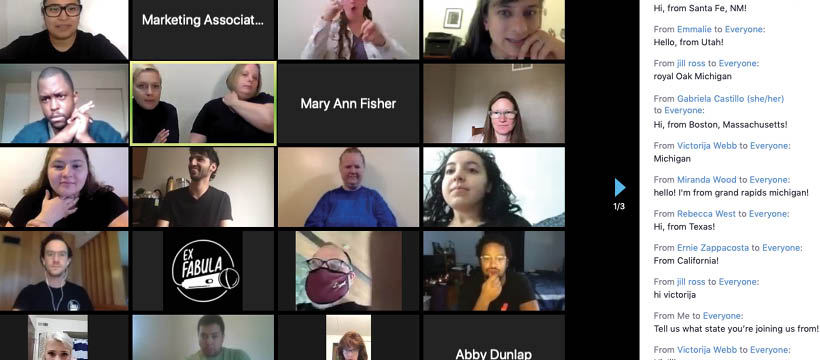When I signed up to write about Ex Fabula’s second Deaf StorySlam, I expected to hear stories about what it is like not to hear. What I got were stories about wanting to be seen.
I don’t mean physically seen. As far I know none of the day’s storytellers had any trouble being physically visible. But because the world is built for people who hear, being deaf also meant fighting against a world that wants to ignore you.
Take Lucas Freimuth for example. Lucas was born in New York and confirmed deaf at three years old. Finding the perfect school or child care option is never easy, but for kids like Lucas there was only one option in the entire state. It was a two hours drive away.
That would be like driving to Wisconsin Dells and back. Every day. Just to go to school.
Eventually, Lucas convinced his parents to let him go to a different school, where he could learn how to talk. Then when his dad got a job in Green Bay, Lucas moved to Wisconsin. The school he found here was much closer to where the family lived, and while leaving his friends was difficult, he quickly made new ones here in Wisconsin.
“When I look back I wish I had more deaf friends in New York, but I am proud to be here and proud to be deaf,” Lucas finished.
Long commutes to school was a common theme in this StorSlam. Marin Kiefer grew up in Appleton but commuted to Green Bay every day to attend a school for deaf children. This was after she got cochlear implants when she was five in order to listen to music with her dad, who loved music. However, the first sound she heard was…not usually considered musical.
“I loved flushing toilets, it was a beautiful sound to me. My mom found me flushing the toilet over and over again.”
One advantage Marin had was that her parents made the effort to learn American Sign Language (ASL). ASL is its own language among 200 other sign languages, and contrary to what some hearing people think it not just a visual version of English but its own distinct language.
As emcee Erin Wiggins noted later in the Slam, around 75% of parents of deaf children do not learn ASL, which limits their ability to communicate with their children to hand signals and gesturing.
This was the case for Jairo Tinoco. Jairo grew up in Mexico before eventually moving to Wisconsin, and his dad never learned ASL despite the fact that Jairo and his younger brother were deaf.
“My dad did try to communicate with us, not by learning ASL but by gesturing. It worked, but it was imperfect.”
In addition to communication issues, Jairo and his family were “nomadic” throughout his childhood. He remembered when his mom and dad would start fighting, he and his brothers would run to the candy store to stock up, because they knew they and their dad would be on the road again soon enough. This nomadic lifestyle continued until Jairo moved in with his grandmother, and eventually to Wisconsin where he would begin his adult life.
Jairo’s story reminded me that although this StorySlam centered the deaf experience, the deaf experience does not exist in a vacuum devoid of the rest of the world’s problems.
Allison ______ followed this with a story about her recent coming to terms with her internalized racism. Delivered in the form of a poem, Allison’s story tracked how she has learned from a variety of books and videos about how her own internalized racism has caused harm in ways she didn’t anticipate or prepare for.
Eric Murphy’s story underscored this. When Eric was six, he was wandering the grocery store aisles with his mom when they confronted a white woman giving them a look. Eric couldn’t listen in, but he noticed his mom getting progressively more upset until finally she grabbed him and left.
Eric, who is Black, asked his biracial mother what happened. She explained that the white woman called her “an abomination for having a Black baby since she looked white.”
“Does that mean that people in the world don’t like us because we have a different skin color?” Eric asked.
“Yes,” his mom replied.
“That was my first experience with racism,” Eric said. “Do people see me as a person or do they only see the color of my skin?”
Eric’s focus on sight stuck with me. In a StorySlam centering deaf people, he was worried about how he was seen. While other tellers didn’t say it explicitly, they also seemed troubled by how they were, or are, seen in a world built for hearing people.
Being born deaf usually means, at minimum, jumping from school to school trying to find acceptance while your family may or may not learn how to communicate with you. During and after childhood, these challenges are compounded by other -isms that exist for deaf and hearing people alike.
The least hearing people can do is see that.






Leave A Comment